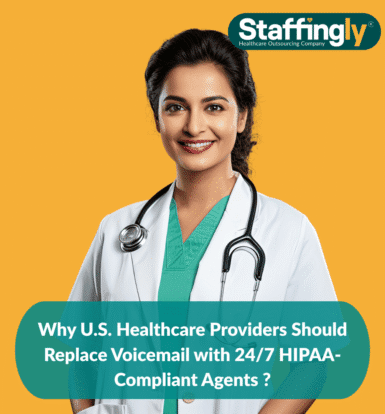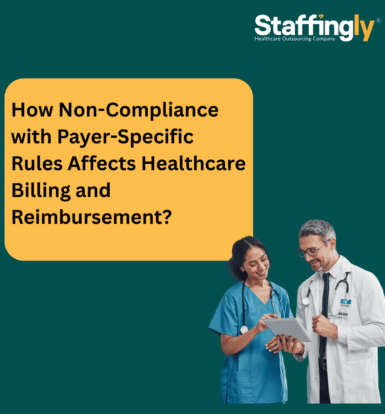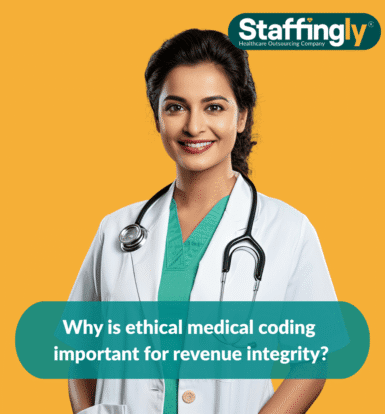On-Demand Outsourcing BPO Services for Healthcare Providers With 24/7 Coverage!
Save up to 70% on staffing costs!
Browse Specialty Staffing Services
What steps can healthcare providers take to optimize IVR for outbound patient communication?
In US healthcare, administrative bottlenecks drain time, money, and staff morale. Manual data entry is one of the biggest culprits, often leading to delays, errors, and compliance risks. At Staffingly, Inc., we’ve transformed this process by integrating secure communication tools directly into providers’ EHR/EMR systems. One clinic administrator shared, “Messages now drop directly into our EHR — no manual entry required. Our staff finally has time to focus on patients instead of paperwork.” This integration has become a game-changer for

No More Hunting for On Call Doctors at Midnight
Managing after-hours patient calls and ensuring timely responses can be a daunting task for healthcare providers. However, by partnering with Staffingly, a leading healthcare outsourcing company, we streamlined our operations and ensured our escalation protocols were followed meticulously—even during the most challenging hours. One healthcare executive, after listening to a call recording from an outsourced agent, remarked, “Listening to a call recording blew me away. The professional empathy felt like part of our team.” This is a perfect example of

How does HIPAA compliance influence patient trust in healthcare call interactions?
During holidays, our phone lines were overwhelmed. With fewer staff on hand and patients calling for everything from prescription refills to urgent care, it was a logistical nightmare. The phones were ringing off the hook, and the missed calls were piling up, leading to long wait times and patient frustration. Here’s what we found: A surge in calls during holidays left staff scrambling to answer. Many patients couldn’t reach us when they needed to, leading to follow-up issues. Non-urgent calls

How One Frustrated Patient Call Led Us to Bilingual Support ?
In healthcare, language barriers are more than just a communication issue; they can lead to frustration, miscommunication, and ultimately diminished trust between patients and providers. One such call from a frustrated Spanish-speaking patient highlighted the gaps in support for non-English-speaking communities. This experience led to a significant shift in how we approach patient care—introducing bilingual support to better serve Spanish-speaking patients and restore trust. This article explores the importance of bilingual support in healthcare, the benefits it provides to both

Night Shift Patients Actually Call at 9 PM Seriously
When a busy family medicine practice enabled after-hours phone and online scheduling, administrators expected occasional off-hour requests. Instead, they saw a consistent spike at exactly 9 PM—especially from nurses finishing late shifts, manufacturing staff completing evening runs, and parents balancing bedtime routines. This unexpected demand revealed a hidden patient segment that can now be served thanks to Staffingly‘s seamless 24/7 scheduling solutions. Uncovering the Demand: Real-Time Data Insights After implementing Staffingly‘s round-the-clock scheduling and call coverage system, a mid-Atlantic clinic

Why U.S. Healthcare Providers Should Replace Voicemail with 24/7 HIPAA-Compliant Agents ?
Voicemail used to be our safety net. A missed call meant a message, and a message meant we could follow up. But lately, healthcare clinics like ours have noticed something different: calls keep coming, but voicemail inboxes stay empty. Patients aren’t leaving messages. They aren’t waiting for callbacks. In many cases, they’re simply moving on. When we dug into our own data and surveyed patients, it became clear: voicemail isn’t just outdated it’s actively hurting communication. The Reality: Why Patients

How Non-Compliance with Payer-Specific Rules Affects Healthcare Billing and Reimbursement?
In the world of healthcare billing, accuracy is everything. Without it, providers risk facing significant financial losses, delayed reimbursements, or even penalties. According to surveys, the U.S. healthcare system loses a staggering $935 million each week due to inaccurate billing, and many of these losses are linked to under coding, upcoding, and non-compliance with payer-specific rules. But what happens when your medical coding doesn’t meet the specific guidelines set by each payer? In this article, we’ll explore how non-compliance with

Why is ethical medical coding important for revenue integrity?
medical coding isn’t exactly the most glamorous part of healthcare. But it’s absolutely essential. If your codes are off, your revenue takes a hit. If they’re unethical (even by mistake), you could face penalties or audits. That’s why ethical medical coding is the backbone of healthcare revenue integrity—it’s not just about following rules, it’s about protecting the lifeline of your practice. Whether you’re running a clinic, a specialty practice, or managing billing operations, ethical coding keeps your revenue steady and
 Book a Demo to Build Your Team Today!
Book a Demo to Build Your Team Today!


 Read Case Studies
Read Case Studies 



 Virtual Medical Assistants
Virtual Medical Assistants



